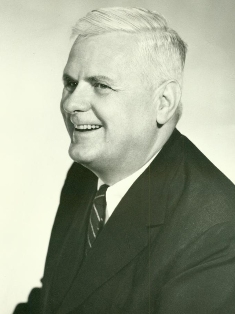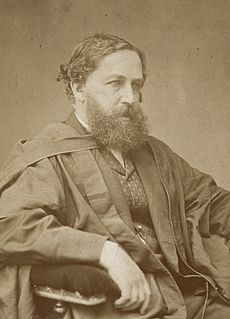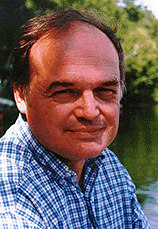
Willard Van Orman Quine was an American philosopher and logician in the analytic tradition, recognized as "one of the most influential philosophers of the twentieth century." From 1930 until his death 70 years later, Quine was continually affiliated with Harvard University in one way or another, first as a student, then as a professor of philosophy and a teacher of logic and set theory, and finally as a professor emeritus who published or revised several books in retirement. He filled the Edgar Pierce Chair of Philosophy at Harvard from 1956 to 1978. A 2009 poll conducted among analytic philosophers named Quine as the fifth most important philosopher of the past two centuries. He won the first Schock Prize in Logic and Philosophy in 1993 for "his systematical and penetrating discussions of how learning of language and communication are based on socially available evidence and of the consequences of this for theories on knowledge and linguistic meaning." In 1996 he was awarded the Kyoto Prize in Arts and Philosophy for his "outstanding contributions to the progress of philosophy in the 20th century by proposing numerous theories based on keen insights in logic, epistemology, philosophy of science and philosophy of language."
Fuzzy logic is a form of many-valued logic in which the truth values of variables may be any real number between 0 and 1 inclusive. It is employed to handle the concept of partial truth, where the truth value may range between completely true and completely false. By contrast, in Boolean logic, the truth values of variables may only be the integer values 0 or 1.

Alonzo Church was an American mathematician and logician who made major contributions to mathematical logic and the foundations of theoretical computer science. He is best known for the lambda calculus, Church–Turing thesis, proving the undecidability of the Entscheidungsproblem, Frege–Church ontology, and the Church–Rosser theorem. He also worked on philosophy of language.

Alfred Tarski, born Alfred Teitelbaum, was a Polish-American logician and mathematician of Polish-Jewish descent. Educated in Poland at the University of Warsaw, and a member of the Lwów–Warsaw school of logic and the Warsaw school of mathematics, he immigrated to the United States in 1939 where he became a naturalized citizen in 1945. Tarski taught and carried out research in mathematics at the University of California, Berkeley, from 1942 until his death in 1983.

William Stanley Jevons FRS was an English economist and logician.
Philosophical logic refers to those areas of philosophy in which recognized methods of logic have traditionally been used to solve or advance the discussion of philosophical problems. Among these, Sybil Wolfram highlights the study of argument, meaning, and truth, while Colin McGinn presents identity, existence, predication, necessity and truth as the main topics of his book on the subject.
Inferences are steps in reasoning, moving from premises to logical consequences; etymologically, the word infer means to "carry forward". Inference is theoretically traditionally divided into deduction and induction, a distinction that in Europe dates at least to Aristotle. Deduction is inference deriving logical conclusions from premises known or assumed to be true, with the laws of valid inference being studied in logic. Induction is inference from particular premises to a universal conclusion. A third type of inference is sometimes distinguished, notably by Charles Sanders Peirce, distinguishing abduction from induction, where abduction is inference to the best explanation.
Modal logic is a type of formal logic primarily developed in the 1960s that extends classical propositional and predicate logic to include operators expressing modality. A modal—a word that expresses a modality—qualifies a statement. For example, the statement "John is happy" might be qualified by saying that John is usually happy, in which case the term "usually" is functioning as a modal. The traditional alethic modalities, or modalities of truth, include possibility, necessity, and impossibility. Other modalities that have been formalized in modal logic include temporal modalities, or modalities of time, deontic modalities, epistemic modalities, or modalities of knowledge and doxastic modalities, or modalities of belief.

George Stephen Boolos was an American philosopher and a mathematical logician who taught at the Massachusetts Institute of Technology.
Ernest Nagel was an American philosopher of science. Along with Rudolf Carnap, Hans Reichenbach, and Carl Hempel, he is sometimes seen as one of the major figures of the logical positivist movement.
Bastiaan Cornelis van Fraassen is a Dutch-American philosopher. He is a Distinguished Professor of Philosophy at San Francisco State University and the McCosh Professor of Philosophy Emeritus at Princeton University, noted for his seminal contributions to philosophy of science.
Bimal Krishna Matilal (1935–1991) was an Indian philosopher whose influential writings present the Indian philosophical tradition as a comprehensive system of logic incorporating most issues addressed by themes in Western philosophy. From 1977 to 1991 he
was the Spalding Professor of Eastern Religion and Ethics at the University of Oxford.
The Association for Symbolic Logic (ASL) is an international organization of specialists in mathematical logic and philosophical logic. The ASL was founded in 1936, and its first president was Alonzo Church. The current president of the ASL is Julia F. Knight.
The Journal of Symbolic Logic is a peer-reviewed mathematics journal published quarterly by Association for Symbolic Logic. It was established in 1936 and covers mathematical logic. The journal is indexed by Mathematical Reviews, Zentralblatt MATH, and Scopus. Its 2009 MCQ was 0.28, and its 2009 impact factor was 0.631.

The Journal of Philosophical Logic is a peer-reviewed scientific journal founded in 1972. It is published by Springer and "provides a forum for work at the crossroads of philosophy and logic, old and new, with contributions ranging from conceptual to technical."
The Nordic Journal of Philosophical Logic was an international journal of philosophy started in May 1996. The journal considered submissions in any of the areas associated with Philosophical Logic and with the application of logic in conceptual analysis. The journal was edited at the Department of Philosophy, University of Oslo. Issues and articles were freely available over the internet, and are still available at the Nordic Journal of Philosophical Logic. Around 2000 the journal transferred to Taylor and Francis, who issued two volumes, but the journal closed in 2002. The issues of the journal published before the transfer of the journal to Taylor and Francis are available at its archive at the University of Oslo, which is also available from the web site of the Scandinavian Logic Society.
Functional logic programming is the combination, in a single programming language, of the paradigms of functional programming and logic programming. This style of programming is embodied by various programming languages, including Curry and Mercury.

Sir Robert Bryson Hall II, known professionally as Logic, is an American rapper, singer, writer, and record producer.









